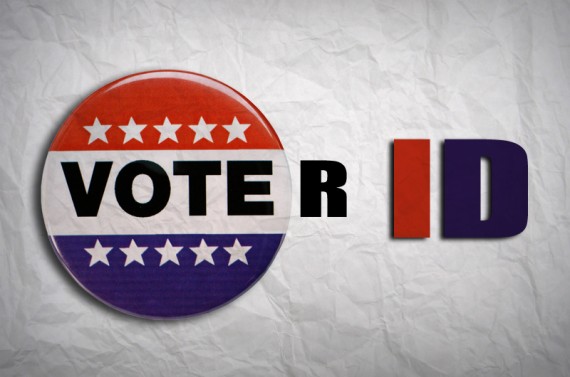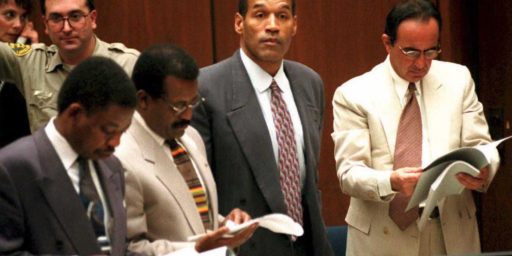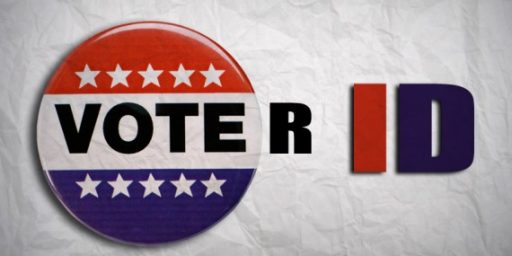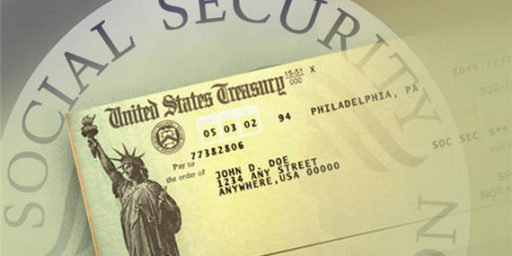Judge Blocks Pennsylvania Voter ID Law For 2012 Elections
A victory for opponents of Pennsylvania's Voter ID law, but likely only a temporary one.
The Pennsylvania trial court judge who has been presiding over challenges to the state’s new Voter ID law issued a ruling today that effectively bars the law from being enforced during the 2012 elections:
A Pennsylvania judge on Tuesday delayed full implementation of a highly contested state law requiring strict photographic identification to vote in next month’s election, saying that the authorities had not done enough to ensure that potential voters had access to the new documents.
The judge, Robert Simpson, who upheld the law in August when it was challenged by liberal and civil rights groups, was instructed by the state’s Supreme Court two weeks ago to hold further hearings. He was told to focus on the question of whether enough had been done to ensure “liberal access” to the picture ID cards or alternatives.
Judge Simpson said in his Tuesday ruling that for the presidential election of Nov. 6, voters in Pennsylvania could be asked to produce the newly required photo IDs, but if they did not have them could still go ahead and vote. The decision could still be appealed to the state Supreme Court.
“While we’re happy that voters in Pennsylvania will not be turned away if they do not have an ID, we are concerned that the ruling will allow election workers to ask for ID at the polls and this could cause confusion,” said Penda D. Hair, co-director of Advancement Project, one of the groups that challenged the law. “This injunction serves as a mere Band-Aid for the law’s inherent problems, not an effective remedy.”
The Pennsylvania law, passed in the spring without any Democratic support, is one of 11 similar laws around the country passed by Republican-dominated legislatures. The laws’ backers say they are trying to ensure the integrity of the electoral process by preventing fraud. But Democrats accuse them of seeking to suppress the votes of the poor and members of minority groups who tend to have neither the needed ID nor the means to go to state offices and obtain one and who tend to vote Democratic.
As I noted last week after the evidentiary hearing that Judge Simpson held in this matter, there were signs that an injunction barring application of the statute for this year was likely to be granted, especially given the standard that the Pennsylvania Supreme Court had set in its ruling. What the Judge effectively did here was bar enforcement of that part of the law that provided that anyone who came to vote without proper identification would be required to cast a provisional ballot and later prove their identity to the local elections board. Instead, at least for November’s election, poll workers can still ask for identification but must still let someone vote even if they don’t have it.
During last week’s hearing, state officials had announced a number of changes to the procedure for issuing identification that were designed to make it easier for people to obtain them. Judge Simpson seems to be quite pleased with those reforms, but his main concern is that there isn’t enough time to implement them before the election without the risk that people will fall through the cracks:
I have three problems with the testimony regarding the proposed changes. First and foremost, the evidence is similar in kind to the prospective “assurances of government officials” testimony which the Supreme Court found an unsatisfactory basis for a “predictive judgment.” Id. at ___, ___ A.3d at ___, slip op. at 6. Second, the proposed changes are to occur about five weeks before the general election, and I question whether sufficient time now remains to attain the goal of liberal access. Third, the proposed changes are accompanied by candid admissions by government officials that any new deployment will reveal unforeseen problems which impede implementation. These admissions were corroborated by anecdotal evidence offered by Petitioners regarding the initial roll-out of the DOS IDs in August. For these reasons, I cannot conclude the proposed changes cure the deficiency in liberal access identified by the Supreme Court
Nevertheless, acknowledgement should be made of improvements in system design by government officials since initial deployment of the DOS ID. These include a more streamlined procedure for validating birth dates, improved scheduling of individuals manning the DOS Help Desk, a more structured referral system for complex Help Desk inquiries, and some extended hours at PennDOT Drivers Licensing Centers, to name a few. Outreach and voter education efforts by PennDOT and DOS, believably described by Deputy Secretaries Myers and Royer, are extensive, surpassing predictions made in the earlier hearing. These existing structural improvements, together with the proposed enhanced access to the DOS ID and additional time, will place the Commonwealth in a better position going forward.
(…)
As of the most recent hearing, between 9300 and 9500 PennDOT IDs for voting have been issued. Also, between 1300 and 1350 DOS IDs have been issued. Further, PennDOT statistics for issuance of initial drivers’ licenses and initial photo IDs for the period March, 2012, through September, 2012, show a slight increase over the same period in 2011. Pet’rs’ Ex. 136. The increase is in the magnitude of 1000 to 2000 a month. Id.
I expected more photo IDs to have been issued by this time. For this reason, I accept Petitioners’ argument that in the remaining five weeks before the general election, the gap between the photo IDs issued and the estimated need will not be closed. I reject Respondents’ argument that my initial estimate was overblown.
Consequently, I am not still convinced in my predictive judgment that there will be no voter disenfranchisement arising out of the Commonwealth’s implementation of a voter identification requirement for purposes of the upcoming election. Under these circumstances, I am obliged to enter a preliminary injunction.
There are two points worth observing here. First, I think the Judge is likely correct that five weeks is insufficient time to fairly implement the new procedures that the state testified to last week. Employees will need to be education on the new procedures, regulations may need to be changed, and voters will need to be educated about what they need to do and how the new procedures differ from how things were done previously. Second, the Judge’s language strikes me as a strong sign that he is likely to uphold the law when this case moves on the Permanent Injunction phase, which may not occur until later this year or early 2013. For purposes of the 2012 election, though, there clearly isn’t enough time to implement the law properly. For that reason, I think the Judge got it right here, but I also strongly suspect that the law will ultimately be upheld.
David Weigel, who has been covering this case since the trial started characterizes this as a defeat for the Pennsylvania Republicans who backed the law. I suppose that’s the case in the short term, but is, as I suspect, the law is ultimately upheld, it will be a temporary loss at most.
Here’s the opinion:







Yeah, a local judge is seldom the final word on these things.
David Weigel, who has been covering this case since the trial started characterizes this as a defeat for the Pennsylvania Republicans who backed the law. I suppose that’s the case in the short term, but is, as I suspect, the law is ultimately upheld, it will be a temporary loss at most.
Actually, it’s a major loss as their goal is not election reform but voter suppression, which they explicitly admitted. Their strategy in places like Pennsylvania has been to confuse the process as much as possible in the hopes that it enough voters will throw their hands up and go home rather than deal with the hassle. That meant passing a convoluted law just months before the election and putting together a piss poor implementation plan.
After this ruling, there’s plenty of time to sort out the mess by the next election, and the mess was what Republicans wanted to create for this election. Voter suppression FAIL.
He did already uphold the law in the initial hearing for a Temporary Injunction, though. The PA Supreme Court didn’t entirely rule on that issue and instead punted the case back to him for further evidentiary hearings based on this “accomodation” issue and the impact it would have on the 2012 elections. Given the instructions the Court had given him, it was rather inevitable that he would issue this injunction. The state can appeal it, but given their last opinion and the fact that time is dwindling, though, I doubt the PA Supremes would reverse him on this particular issue.
@James Joyner:
And he wasn’t. This is his second ruling in the case, becauset the Pennsylvania Supreme Court sent it back after not liking the first ruling.
I know it would likely defeat the intent, but I would have thought that if voter ID really is that critical, it would have been rolled out slowly, in mid-term elections first, with a long lead time for voter education and to provide sufficient time for people to comply and get ID cards.
In other words, if it really, really, is about stopping fraud, take the long view and do it right.
I still find the whole thing problematic–especially the cost of compliance. It’s amusing that the party so opposed to government spending would insist on a law with such a high cost to correct a problem that hasn’t even been proven to _be_ a problem.
@Doug Mataconis:
Republicans needed that win now, since, as mantis pointed out, PA Republicans thought it would help Romney win the state in November.
The next major election is in 2014, PA Democrats just need to make sure that voters can easily get a free voter ID by then.
@Jen:
You are exactly correct. And so is Mantis, who said it before I could – the goal of this effort was _never_ to reduce voter fraud. It was to suppress likely-Dem voting. Period. And the fact that it won’t impact this election is a huge loss for the treasonous dirtbags who pushed it into place, regardless of what the ultimate court decision is.
Bring out ‘yer dead….
I know it would likely defeat the intent, but I would have thought that if voter ID really is that critical, it would have been rolled out slowly, in mid-term elections first, with a long lead time for voter education and to provide sufficient time for people to comply and get ID cards.
This is how NH has elected to move to a voter ID system (although NH doesn’t get much attention because it is pretty much an entirely white state where there aren’t people screaming about supression).
For the current election an ID is required, but voters can still cast votes if they do not have it, they are required to sign an affidavit.
Within the next year the state will also provide a photo ID for voting purposes only that is provided through the DMV.
@Tsar Nicholas: I suggest you go read the reports of the hassles people have had trying to get a picture ID under the present regulations. I also suggest that you note it was admitted when this law was passed that Pennsylvania did not have one single case of proven voter fraud.
And the people on the right squawk about “unnecessary regulation”?! Hah.
Speaking as a Pennsylvanian, I’m not so sure that this is a temporary loss for the Republicans.
Sure, they can push the law through for 2014. However, this naked attempt to disenfranchise the other party’s voters leaves a bad taste in the mouths of moderates and independents. Even worse, it created anger among senior citizens (a traditionally conservative group of voters) because the law was more onerous for people who have had to surrender a driver’s license and who may have difficulty getting an acceptable birth certificate. Then there’s having to wait at the DMV for the ID. Old people do like being made to jump through hoops, especially for things they have always considered a right.
This may well come back to bite the GOP in PA.
@Just Me:
That’s a peculiar way to put it.
The sensible way would be that since it’s all white people, Republicans aren’t trying to suppress anyone’s vote. Hence no one complaining that they are being suppressed.
If State Republicans cut so much funding from the DMV that they could only be open one hour every other week in rural areas, you would start to hear screaming about voter suppression. It’s no virtue that Republicans don’t do that to white people, only non-white people.
HEY CHEATERS.
SUUUUUUUUCK IIIIIIIIIIIIIIIIIIIIIIIIIIT.
Hahahaha.
Deal with it, cheating scum.
@Tsar Nicholas:
Bring out ‘yer dead….
They’re not dead yet.
And they want to vote. Why do you want them stopped?
@Commonist: How old are you? Please refrain from commenting unless you have something interesting to say.
For that reason, I think the Judge got it right here, but I also strongly suspect that the law will ultimately be upheld.If State Republicans cut so much funding from the DMV that they could only be open one hour every other week in rural areas, you would start to hear screaming about voter suppression.
The state did cut a large amount of funding to the DMV and closed most of its rural and satellite offices. Most people in NH have to drive a great distance to renew licenses and other DMV type actions.
I think the difference is that NH is and has always been a rural state-and few people expect a 10 minute drive for anything-whether it is groceries or government services.
Still no whining about disenfranchisement here. It also doesn’t help that during the primary a group of video people asked for and obtained ballots for dead people (they did not vote but if they did receive ballots to vote). This was before the voter ID law was phased in.
I think it is hard to argue that voter fraud never happens-mostly because it is hard to prove.
Oh well, block quote fail.
Hence no one complaining that they are being suppressed.
Well, actually, they are. Four college students have sued to block a provision of the voter ID law, which–I think I have this right–says that they need to sign a document saying that they are subject to all laws that apply to residents. This would include things like having your car registered in New Hampshire. I believe the most recent status of that is that portion of the law is currently blocked by the courts and is under review.
Over the long term Pennsylvanians should probably vote absentee, vote out the disenfranchisers.
There is plenty of proven fraud when absentee ballots are used. Essentially none of the kind that voter ID would prevent. Yet, we are going after voter ID. I think that makes the intent of these laws pretty clear. Also, reading this, I am irritated that my taxes (PA resident here) are being used to keep offices open longer to implement a law we dont need, That, is a true waste of money.
Steve
Sorry for the two posts – my browser lied to me.
@grumpy realist:
Is there really anything more proper to give the people trying to disrupt democracy than juvenile insults?
@Jen: In other words, if it really, really, is about stopping fraud, take the long view and do it right.
If it was really about fraud there is an obvious solution to the disenfranchisement problem that I thought the judge might almost reach here. If a person shows up at the polling place without the necessary ID give them the equivalent of an absentee ballot and treat it the same way as any other absentee ballot turned in on Election Day, subject to the same verification. This would be more fraud proof than regular absentee voting, since it is subject to the same verification, but could not be sold like a regular absentee as a blank ballot with signature, (or one filled out to the buyers specifications.)
@Doug Mataconis: Doug, do you admit that the stated purpose of this law is partisan voter suppression?
Barry,
The intent of the law is irrelevant. If applied properly it is just as Constitutional as the law that Indiana passed many years ago that was upheld by the Supreme Court.
@Jen: Jen, everything that you say is evidence in addition to the confession that this is not about protecting the vote, or preventing fraud, but rather about perpetrating fraud.
@Tsar Nicholas: Still lying that lie?
It’ll be sweeeeeeeeeeeeeeeeeeeeeeeeeeeeeeeeeeeeeeeeeeeeeeeeet when President Obama is sworn in for another four years. I really hope that you choke on it.
@Just Me: “I think the difference is that NH is and has always been a rural state-and few people expect a 10 minute drive for anything-whether it is groceries or government services.”
I think that the difference is that NH is a teeeny tiny little state.
@Just Me: “I think it is hard to argue that voter fraud never happens-mostly because it is hard to prove. ”
A faction with means, motive and opportunity to prove it can’t, pure and simple.
@Doug Mataconis: So you won’t admit the stated truth?
@Jen:
This is the only sane position for anyone who actually believes that these Voter ID measures are to ensure a lawful voting process. There has been very few cases of voter ID fraud, so there is no earthly reason to do this weeks before an important election.
Though there is plenty of reason to believe these measures aren’t about preserving democracy at all; rather, just the opposite.
@Doug Mataconis: The intent of the law is irrelevant.
This is questionable as relates to constitutionality, but it is very relevant to this issue:
How many states now have voter-ID laws, 22 or so? Some with pictures and some without.
I suspect more will have such a law by 2014 or 2016, and more people will have a required ID.
Rather than moan and groan about disenfranchisement, why not put that misplaced energy, whining, and perhaps a few bucks into assuring that anyone wanting to vote gets his ID well in advance, should he actually need one, and not have one of the many authorized substitutes already. Run a voter registration campaign and a voter ID campaign in parallel and take it to the boonies–schools, post offices, and DMVs over the next year.
Just become law-abiding and useful citizens that support a simple requirement—-that to vote, you should be able to prove who you are, and ditch the opposition to such a logical need.
@mannning:
Or, I can reject your false premise and continue to oppose attempts to reduce the participation of the poorer segments of society.
@mannning: “Rather than moan and groan about disenfranchisement, why not put that misplaced energy, whining, and perhaps a few bucks into assuring that anyone wanting to vote gets his ID well in advance, should he actually need one, and not have one of the many authorized substitutes already. Run a voter registration campaign and a voter ID campaign in parallel and take it to the boonies–schools, post offices, and DMVs over the next year. ”
We are. The difference is that given a year or more, we can make sure that people do, despite being short of money, despite juggling multiple jobs, children, lousy transportation, and your attempts to f*ck up the system by closing government office in key areas.
In the meantime, s*ck on it. President Obama – four more years!
@Barry:
You read poorly. Note the year I mentioned, which is the least needed to ensure voter ID is well in hand. It is obviously too late to initiate it for 2012. Then too, I live in a state that has a voter ID system already, so “I” am not closing anything, nor would I. You simply have this need to castigate everyone not in your party, don’t you?
@Rick Almeida:
Unfortunately, you can reject that premise all you want, but a lot more than 22 states will have voter ID laws by 2014 or 2016, along with adequate provisions for the poor to obtain the IDs. Your reflexive rejection is rather pathetic in the face of so many state laws coming on line that do recognize the difficulties involved for the poor and make provisions for it.
In most instances, the whole rejection is to me a tempest in a teapot. There are so many practical solutions to the problem of getting all qualified voters an ID over a year or so that the states are implementing, it is rather difficult to understand the continuing objections by the liberal side. I suppose it is driven by scraping up the very last non-IDed voter for Obama this year, but that will be a futile exercise by the next election cycle, if not much, much sooner in November.